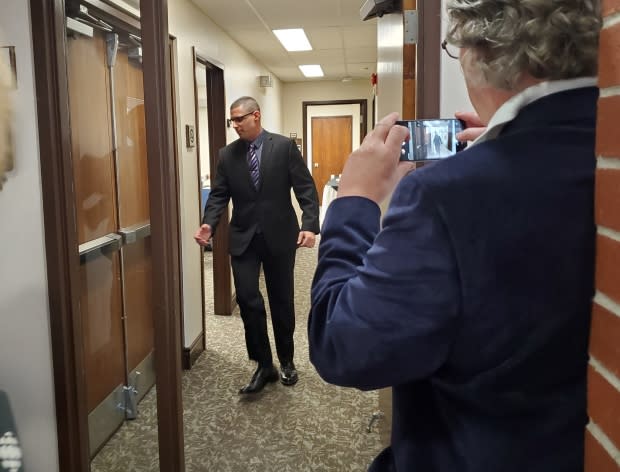No link between ADHD and falsifying police reports, expert tells officer's hearing
A forensic psychiatrist says there's no link between attention deficit hyperactivity disorder and lying or falsifying police reports.
Dr. Jonathan Rootenberg, a Fredericton Police Force witness, disputed previous testimony that Const. Zach Coady falsified reports partly because of undiagnosed ADHD.
"Having a specific difficulty — focusing, for instance — is in no way linked to fabricating something or not being honest," he said. "They're not linked at all."
The Fredericton force is looking to fire Coady after he told a superior he lied on reports about calling complainants back and following up on leads. Coady was charged under the Police Act with discreditable conduct, neglect of duty and engaging in deceit. He denied the accusations in November 2018 but admitted to them in late March.
In late June, Saint John-based psychiatrist Dr. Edward Yuzda said undiagnosed ADHD may be partly why Coady falsified reports by saying that he followed up on leads when he didn't and contacted complainants when he hadn't.
Yuzda said lying is not a symptom of ADHD. But he said Coady was in a stressful environment where he couldn't keep up with the work because of his ADHD, and this led him to cover up shortcomings in his work by falsifying reports.
On Thursday, during an arbitration hearing that's deciding Coady's fate, Rootenberg said he had a session with Coady in May of this year, and he saw absolutely no link between his disorder and the false reports.

"ADHD does not rob you of being able to rationally think … it doesn't change your ability to perceive reality," he said.
Rootenberg also said by the time they met, Coady wasn't showing any symptoms of ADHD or depression.
"I found him to be quite forthright during our meeting," he said.
Coady's defence lawyer, T. J. Burke, previously said his client's medical problem should mean the police force needs to accommodate his condition, not fire him for it.
"It's very much akin to somebody who has a particular disability that is not an obvious physical disability like alcoholism," Burke previously told CBC.
False reports
In May of 2017, Speedy Auto Glass reported a car was broken into. Coady closed the file without investigating and wrote that he had informed the complainant the file was inactive. He admitted that that was a lie.
Later that month, he lied about responding to a reported theft of gas at a Fredericton Irving station. He said he viewed a surveillance video and submitted a photo to the police force to attempt to identify a person of interest. But he did not do that.
Followups that were noted in files but never done and claims that complainants were contacted when they weren't were part Coady's reports in three other cases. These include a minor theft of a tip jar from a fish and chips shop and the theft of tools from a worksite at a hotel.
Closing arguments
The lawyer for the police force, Jamie Eddy, presented his final arguments on Thursday afternoon.
He said Coady's guilt is not in question, as he's already admitted to the charges and was found guilty. The question is the penalty, and to the police force, that can only be dismissal — even if this was his first infraction, and even if he was never been disciplined before.
"Anything less than dismissal will bring the administration of the police force and administration of justice into disrepute," said Eddy.

He said an honest police force is in the public interest, and police officers are held to a high standard.
"The threshold is much higher than a typical employee. … It's much higher than a typical millworker. There is a level of public interest and a public component to the application of discipline to a police officer."
Coady has been on paid leave since his suspension last year.
Implications for future cases
Eddy said only 17 of Coady's reports were audited, and five false reports were found, so 29 per cent of Coady's reports were false. To Eddy, this means Coady's credibility can't be recovered.
"Occurrence report falsifications were premeditated and intentional," he said. "This is not a heat-of-a-moment decision. That's not what we have here."
Even if Coady were to return to the job, his public admission of dishonesty might provide "fertile grounds" for cross-examination to undermine the reliability of cases he investigates, Eddy said.
Coady's lawyer, T.J. Burke, said ADHD is a disability recognized by law. In an interview, Burke said he must establish a causal connection between Coady's disability and the actions to which he pleaded guilty, and must persuade the arbitrator to accommodate Coady because of his disability.
"How do you know you're suffering from a mental health issue if you haven't had a professional psychiatrist inform you of what you're suffering from?" Burke said.
Burke will present written arguments next month. Arbitrator Robert Breen is hearing the case and will give his decision in early September.


